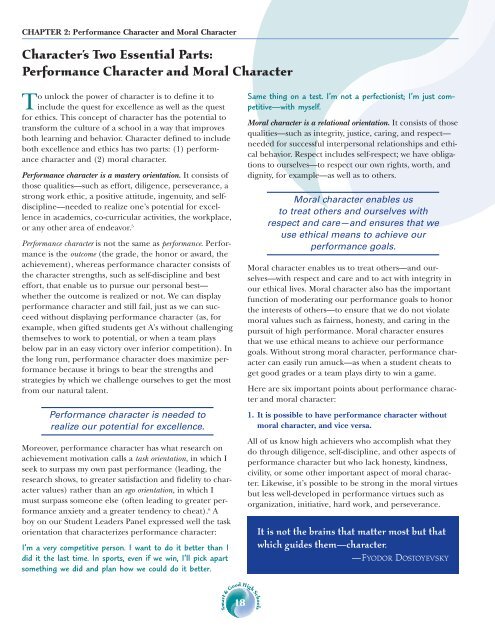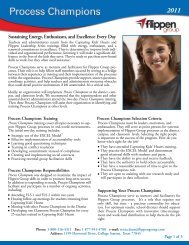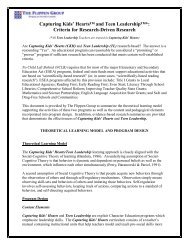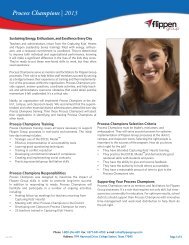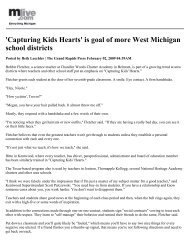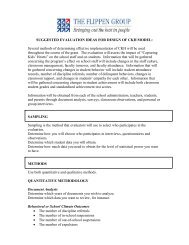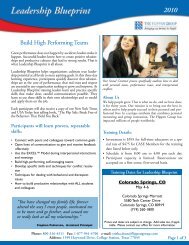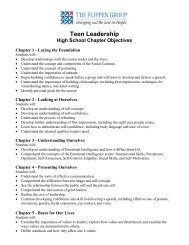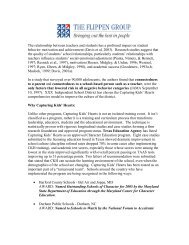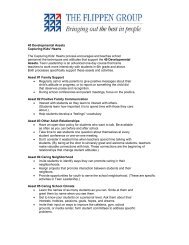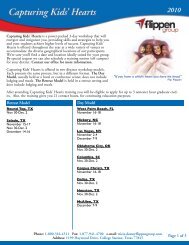Smart & Good High Schools - The Flippen Group
Smart & Good High Schools - The Flippen Group
Smart & Good High Schools - The Flippen Group
- No tags were found...
Create successful ePaper yourself
Turn your PDF publications into a flip-book with our unique Google optimized e-Paper software.
CHAPTER 2: Performance Character and Moral CharacterCharacter’s Two Essential Parts:Performance Character and Moral CharacterTo unlock the power of character is to define it toinclude the quest for excellence as well as the questfor ethics. This concept of character has the potential totransform the culture of a school in a way that improvesboth learning and behavior. Character defined to includeboth excellence and ethics has two parts: (1) performancecharacter and (2) moral character.Performance character is a mastery orientation. It consists ofthose qualities—such as effort, diligence, perseverance, astrong work ethic, a positive attitude, ingenuity, and selfdiscipline—neededto realize one’s potential for excellencein academics, co-curricular activities, the workplace,or any other area of endeavor. 5Performance character is not the same as performance. Performanceis the outcome (the grade, the honor or award, theachievement), whereas performance character consists ofthe character strengths, such as self-discipline and besteffort, that enable us to pursue our personal best—whether the outcome is realized or not. We can displayperformance character and still fail, just as we can succeedwithout displaying performance character (as, forexample, when gifted students get A’s without challengingthemselves to work to potential, or when a team playsbelow par in an easy victory over inferior competition). Inthe long run, performance character does maximize performancebecause it brings to bear the strengths andstrategies by which we challenge ourselves to get the mostfrom our natural talent.Performance character is needed torealize our potential for excellence.Moreover, performance character has what research onachievement motivation calls a task orientation, in which Iseek to surpass my own past performance (leading, theresearch shows, to greater satisfaction and fidelity to charactervalues) rather than an ego orientation, in which Imust surpass someone else (often leading to greater performanceanxiety and a greater tendency to cheat). 6 Aboy on our Student Leaders Panel expressed well the taskorientation that characterizes performance character:I’m a very competitive person. I want to do it better than Idid it the last time. In sports, even if we win, I’ll pick apartsomething we did and plan how we could do it better.Same thing on a test. I’m not a perfectionist; I’m just competitive—withmyself.Moral character is a relational orientation. It consists of thosequalities—such as integrity, justice, caring, and respect—needed for successful interpersonal relationships and ethicalbehavior. Respect includes self-respect; we have obligationsto ourselves—to respect our own rights, worth, anddignity, for example—as well as to others.Moral character enables usto treat others and ourselves withrespect and care—and ensures that weuse ethical means to achieve ourperformance goals.Moral character enables us to treat others—and ourselves—withrespect and care and to act with integrity inour ethical lives. Moral character also has the importantfunction of moderating our performance goals to honorthe interests of others—to ensure that we do not violatemoral values such as fairness, honesty, and caring in thepursuit of high performance. Moral character ensuresthat we use ethical means to achieve our performancegoals. Without strong moral character, performance charactercan easily run amuck—as when a student cheats toget good grades or a team plays dirty to win a game.Here are six important points about performance characterand moral character:1. It is possible to have performance character withoutmoral character, and vice versa.All of us know high achievers who accomplish what theydo through diligence, self-discipline, and other aspects ofperformance character but who lack honesty, kindness,civility, or some other important aspect of moral character.Likewise, it’s possible to be strong in the moral virtuesbut less well-developed in performance virtues such asorganization, initiative, hard work, and perseverance.It is not the brains that matter most but thatwhich guides them—character.—FYODOR DOSTOYEVSKY18<strong>Smart</strong> & <strong>Good</strong> <strong>High</strong> <strong>Schools</strong>


